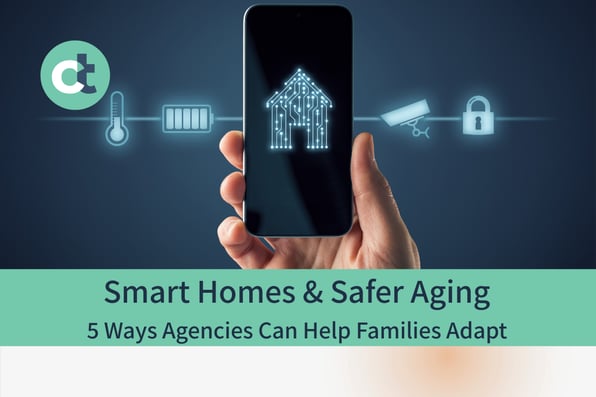Smart Homes and Safer Aging: 5 Ways Agencies Can Help Families Adapt

Most families want their loved ones to stay at home as long as possible. Aging in place is no longer just an ideal, it’s quickly becoming the default plan for many.
Smart home devices are often the first step families take to support that goal. They install video doorbells, motion sensors, voice assistants, and other tools meant to increase safety and comfort. These gadgets are often sold as simple solutions, but families quickly realize that setup is only the beginning.
Smart homes aren’t always simple. Devices break. Apps don’t sync. People forget to charge things or struggle to use them. The promise of peace of mind turns into another layer of stress.
That’s where home care agencies have a real opportunity to help, not just by adding technology, but by helping families use it well.
The Real Reason Families Turn to Smart Home Devices
For many families, adding smart tech is a way to feel more in control. A daughter might install a camera at the front door so she knows who’s coming and going. A son may add a motion sensor in the hallway to track nighttime movement. A grandson sets up a voice assistant to help his grandmother turn on the lights with a simple command.
These tools offer convenience, but more importantly, they offer a sense of connection. Families want to know their loved ones are safe, even when they can't be there in person. But tech alone can’t provide that comfort, not without human support to make it work.
5 Ways Agencies Can Support Smart Home Efforts
1. Ask What’s Already Installed
Families don’t always mention the smart devices they’ve set up. Ask them directly. Knowing what’s in place, from door sensors to medication reminders, can help you understand how to coordinate care more smoothly and avoid overlaps or confusion.
2. Train Caregivers on What Matters
Caregivers are often the ones interacting with these tools. A quick walkthrough on how to use the video doorbell or what to do if the voice assistant stops working can go a long way. Even more important is knowing what’s expected of them when tech is involved, like checking in when a motion alert is triggered or making sure a smart pillbox was opened.
3. Sync Schedules With Devices
If a caregiver is scheduled to arrive at a certain time, that visit should align with any motion alerts or camera activity. A mismatch between what the schedule says and what the tech shows can lead to questions from family members. Keeping visit times clear and consistent helps reduce confusion and build trust.
4. Offer Guidance Without Overpromising
You don’t have to be a smart home expert. But you can still help families sort through what’s helpful and what’s not. If a device is creating more stress than support, recommend something simpler. Your role isn’t to fix every tech problem. It’s to keep the focus on care, not gadgets.
5. Keep Communication Simple
No matter how many devices a family uses, they still need updates in plain language. A quick message confirming a visit or noting a change in behavior will always be more reassuring than a complicated alert from a sensor they barely understand. The more clearly you communicate, the more those devices become tools, not obstacles.
Smart Homes Should Support Care, Not Complicate It
Technology should make life easier. But in many homes, smart devices add just as much confusion as clarity. They’re only helpful when they fit into a larger care plan, and when caregivers, agencies, and families all understand how they work together.
Agencies that take time to ask the right questions, support caregivers on the ground, and communicate clearly can help families make the most of the tech they already have. That kind of help doesn’t require a new system or a fancy device. It just takes a little attention and a lot of care.
Get Awesome Content Delivered Straight to Your Inbox!
Posts by topic
- Home Care Management
- Electronic Visit Verification (EVV)
- EVV software
- billing
- Caregiver Recruitment and Retention
- Home Care Management for Franchises
- payor types
- Homecare Homebase
- Revenue Growth
- Compliance
- caregiver registry
- Business
- Medicaid Billing
- Revenue Cycle Management
- Third Party Billing
- medicaid
- Cash Flow
- Medical Billing Software
- Medicare
- Press Release
- payor
- Claim Denials
- Marketing & Sales
- Operations
- Outsource Your Medical Billing
- RCM
- Scheduling
- agency owners
- cdpap
- home care growth
- legislation
- referrals
- regulations
- Events
- Home Care Revenue
- Industry Insights
- Lifestyle
- billing delays
- home care owners
- leadership
- leadership insight
- partners See All See Less

.png?width=620&height=620&name=Grow-Your-Caregiver-Network-eBook-Download%20(1).png)
.png?width=596&name=1%20(17).png)

.png?width=596&name=1%20(16).png)